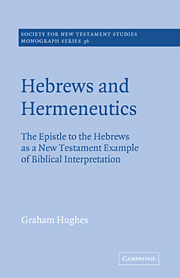 Hebrews and Hermeneutics
Hebrews and Hermeneutics The inclination to introduce any study on the Epistle to the Hebrews by remarking in some way or another on the enigma which attends this important letter of our New Testament canon seems almost irresistible. The tendency is not difficult to account for. On one hand the letter's significance as an early source for, and continuing influence upon, the devotional piety and understanding of Christians is unquestionable. Attention is frequently drawn, for instance, to its important statements about the nature of worship. It is the source of profoundly important Christian conceptions such as the highpriesthood of Christ, or of Christian life as an ongoing pilgrimage. Over many centuries Christian theologians have allowed themselves to be guided in Christological explorations by the heavy emphases the letter places on both the humanity of Jesus and also his dignity as Son of God. Some passages, for example the ‘definition of faith’ at the head of chapter 11 or the carefully written opening statement about the Word of God which culminates in Jesus the Son, have regularly served as models for the expression of these ideas.
But on the whole these contributions made by the unknown author of our letter function in isolation from their context. As a document, the letter attracts only minimal attention either from scholars, or from those who read for more devotional or homiletical purposes.
To save this book to your Kindle, first ensure [email protected] is added to your Approved Personal Document E-mail List under your Personal Document Settings on the Manage Your Content and Devices page of your Amazon account. Then enter the ‘name’ part of your Kindle email address below. Find out more about saving to your Kindle.
Note you can select to save to either the @free.kindle.com or @kindle.com variations. ‘@free.kindle.com’ emails are free but can only be saved to your device when it is connected to wi-fi. ‘@kindle.com’ emails can be delivered even when you are not connected to wi-fi, but note that service fees apply.
Find out more about the Kindle Personal Document Service.
To save content items to your account, please confirm that you agree to abide by our usage policies. If this is the first time you use this feature, you will be asked to authorise Cambridge Core to connect with your account. Find out more about saving content to Dropbox.
To save content items to your account, please confirm that you agree to abide by our usage policies. If this is the first time you use this feature, you will be asked to authorise Cambridge Core to connect with your account. Find out more about saving content to Google Drive.